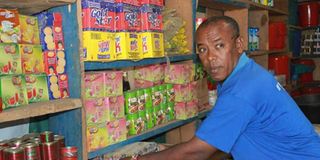Over 150,000 Kakuma refugees to benefit from new food voucher from WFP

Mr Abebe Chanako, a shop owner at the Ethiopian market in Kakuma. He says most traders prefer the voucher system compared to the direct cash system because of the security involved.
PHOTO | KENNEDY KIMANTHI | NATION MEDIA GROUP
What you need to know:
- The voucher will be used to purchase selected food items from selected shops within the camp.
- Those to benefit from the new system have been identified from UHNCR’s database which enables the refugees to receive food rations through biometric checks.
- However, the e-voucher system is likely to face challenges as some of the targeted refugees do not have cell phones.
- WFP requires the traders it contracts for vouchers to have spare mobile phones on site for customers to use if they do not have their own phones.
Close to 150,000 registered refugees living at Kakuma Refugee Camp in Turkana County will soon benefit from a new electronic food voucher system known as Bamba Chakula.
Introduced by the World Food Programme (WFP), the electronic vouchers will be loaded with an initial monthly per-person value of Sh100 which will only be used to purchase food.
The voucher, a joint venture between WFP, United Nations High Commissioner for Refugees (UNHCR) and Safaricom, will be used to purchase selected food items from selected shops within the camp that hosts 181,393 refugees from 20 different countries.
According to WFP National Programme Officer in Kakuma Jacinta Abenyo, refugees largely depend on WFP's in-kind food assistance, a ration composed of cereals, vegetable oil and salt that is provided through the general food distribution (GFD) which is done once or twice in a month.
“Market assessment conducted in the camp found that refugees sell part of their GDF rations to diversify their diets.
“WFP is introducing vouchers in order to solve this problem, to give refugees access to a larger variety of food types, and to reduce the economic loss they incur when they sell the relief food at throw-away prices,” Ms Abenya said.
UNHCR DATABASE
She added that those to benefit from the new system have been identified from UHNCR’s database which enables the refugees to receive food rations through biometric checks.
In the new system, refugees who will be issued with a SIM card for the vouchers from WFP will passes through biometrics to collect food.
WFP will then transfer a voucher value to a ‘wallet’ on that refugee’s SIM card.
The voucher ‘wallets’ are ‘locked’, which means that they can only be used at about 200 WFP contracted, approved and monitored retailers in the markets across the camp.
The traders who will participate in the programme must be paying business licensing fees, need to pass health and food safety inspections and must allow regular inspections and monitoring by WFP.
When the household buys food with the voucher, the value redeemed by the retailer will flow from WFP’s account to the retailer’s M-Pesa account.
According to WFP communications officer Martin Karimi, the new system is expected to boost the local economy.
DIETARY DIVERSITY
Mr Karimi says it gives the refugees a dietary diversity.
However, the e-voucher system is likely to face challenges as some of the targeted refugees do not have cell phones.
A phone ownership census conducted in April 2015 showed that only about 40 per cent of refugees arriving at Kakuma own phones.
To deal with this, WFP requires the traders it contracts for vouchers to have spare mobile phones on site for customers to use if they do not have their own phones.
Mr Abebe Chanako, a shop owner at the Ethiopian market says most traders prefer the voucher system compared to the direct cash system because of the security involved.
Mr Chanako noted that they do not want to handle cash in their shops for fear of being targeted by criminals.
“It will provide an opportunity to improve the quality of food sold in the shops as well as the reliability of the supply to the camp markets,” he said.
His sentiments were echoed by Mr Tahfr Bariso Sunka, an Ethiopian trader at the Mogadishu market who added that the value of the voucher should be increased gradually, based on how the local markets respond.




